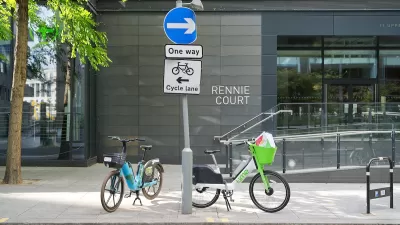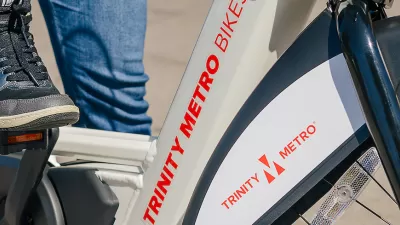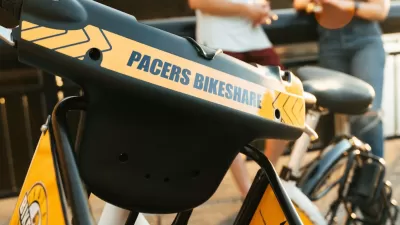In its five years of operation, Detroit’s MoGo bikeshare has added electric and adaptive bikes to its fleet of more than 600 bikes.

Detroit’s bikeshare system is celebrating its fifth anniversary this month. According to a press release from Mogo, “The May 23 anniversary commemorates five years to the day that MoGo launched in Detroit and comes on the heels of reaching the 500,000-ride-milestone.”
“MoGo, with the support of operations partner Shift Transit, title sponsors Henry Ford Health and Health Alliance Plan, Downtown Detroit Partnership, and the City of Detroit, launched on May 23, 2017 with 43 stations and 430 bikes around the Greater Downtown Detroit area, providing active transportation as far east as West Village, north to the North End, and west to Southwest Detroit.” The system started adding electric bikes in 2018.
“Of MoGo’s current Annual Pass members, nearly 30 percent subscribe to the Access Pass, a $5 annual pass which is available to any Michigan resident that receives state benefits such as SNAP or Medicare. MoGo has also offered a cash payment option since launch, giving unbanked individuals the same access to the system.”
The press release notes that “MoGo has also made biking more physically accessible. Through its Adaptive program, MoGo has become a national leader in making biking available to those who may not otherwise be able to ride due to physical or cognitive challenges. This month, MoGo will expand its Adaptive offerings beyond the Detroit Riverwalk to include Downtown Ferndale.”
FULL STORY: MoGo Celebrates 5 Years of Bikeshare Service in Metro Detroit

Americans May Be Stuck — But Why?
Americans are moving a lot less than they once did, and that is a problem. While Yoni Applebaum, in his highly-publicized article Stuck, gets the reasons badly wrong, it's still important to ask: why are we moving so much less than before?

Using Old Oil and Gas Wells for Green Energy Storage
Penn State researchers have found that repurposing abandoned oil and gas wells for geothermal-assisted compressed-air energy storage can boost efficiency, reduce environmental risks, and support clean energy and job transitions.

Placekeeping: Setting a New Precedent for City Planners
How a preservation-based approach to redevelopment and urban design can prevent displacement and honor legacy communities.

San Francisco’s Muni Ridership Grew in 2024
The system saw its highest ridership since before the Covid-19 pandemic, but faces a severe budget shortage in the coming year.

Colorado Lawmakers Move to Protect BRT Funding
In the face of potential federal funding cuts, CDOT leaders reasserted their commitment to planned bus rapid transit projects.

Safe Streets Funding in Jeopardy
The Trump administration is specifically targeting bike infrastructure and other road safety projects in its funding cuts.
Urban Design for Planners 1: Software Tools
This six-course series explores essential urban design concepts using open source software and equips planners with the tools they need to participate fully in the urban design process.
Planning for Universal Design
Learn the tools for implementing Universal Design in planning regulations.
Heyer Gruel & Associates PA
City of Moreno Valley
Institute for Housing and Urban Development Studies (IHS)
City of Grandview
Harvard GSD Executive Education
Salt Lake City
NYU Wagner Graduate School of Public Service
City of Cambridge, Maryland





























